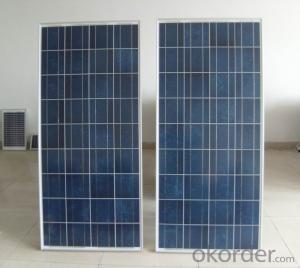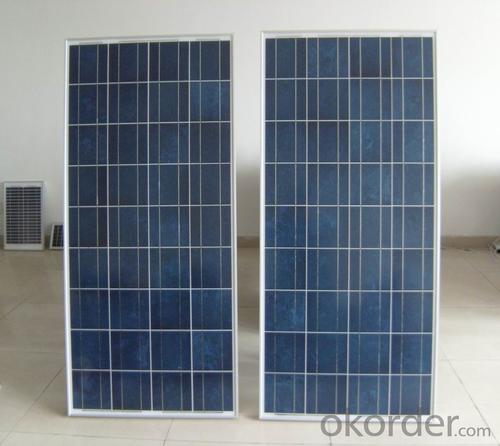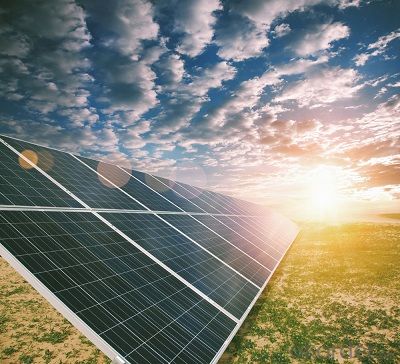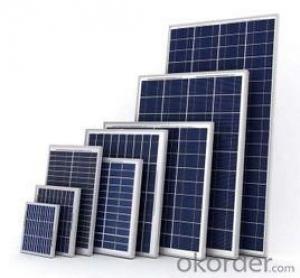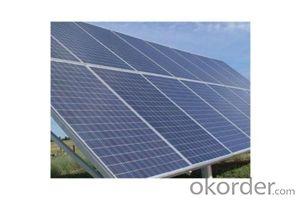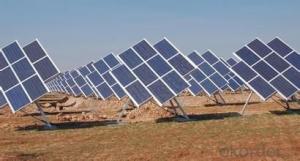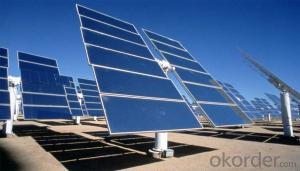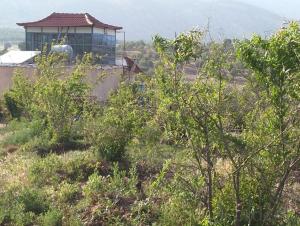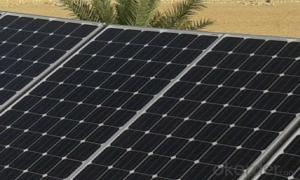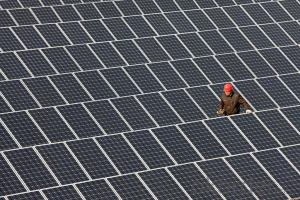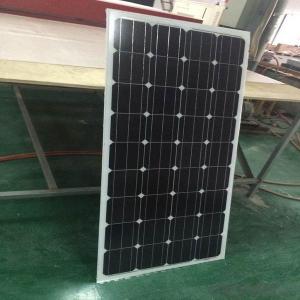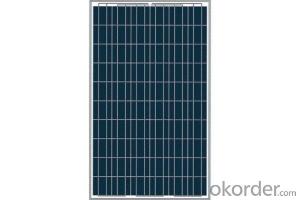CE and TUV Approved High Efficiency 150W Mono Solar Panels on Roof
- Loading Port:
- Shanghai
- Payment Terms:
- TT OR LC
- Min Order Qty:
- 10000 watt
- Supply Capability:
- 20000000 watt/month
OKorder Service Pledge
OKorder Financial Service
You Might Also Like
Specification
Product Description:
1.Structure of Polycrystalline Silicon Solar Panel
I. High efficiency crystalline silicon solar cell. Even if under the weak light, the solar module can produce maximum power output.
II. Tempered glass (toughened glass): Anti-reflecting coating and high transmission rate glass increase the power output and mechanical strength of solar module.
III. EVA and TPT: Using high quality EVA and TPT to prevent destroying and water.
IV. AI frame: Without screw, rner connection. 6 holes on the frame can be installed easily.
V. Junction box: Multi function junction box with water proof.
VI. Long lifetime: ≥25 years; Less power decrease.
VII. Good performance of preventing from atrocious weather such as wind and hails.
VIII. Resisting moisture and etching effectively, not effected by geology.
IX. The certificate issued by international authority: UL, TUV, IEC, CE.
2.Characteristics
1)Manufactured according to international quality and Environment Management
System (ISO9001, ISO14001)
2)High efficiency crystalline silicon solar cells
3)High transmission Iow iron tempered glass, strong mechanical resistance
4)Anti-ageing EVA and excellent anti-climate back sheet
5)Anodized aluminum frame improves load resistance capabilities for heavy wind loads.
6)Standard waterproof junction box
7)High endurance to different weather
8)Good and friendly package with less transportation and storage space.
3.Warranty
1)10 years limited manufacturing warranty
2)10 years for 90% of warranted minimum power
3)25 years for 80% of warranted minimum power
4.The Pictures of Solar Panels
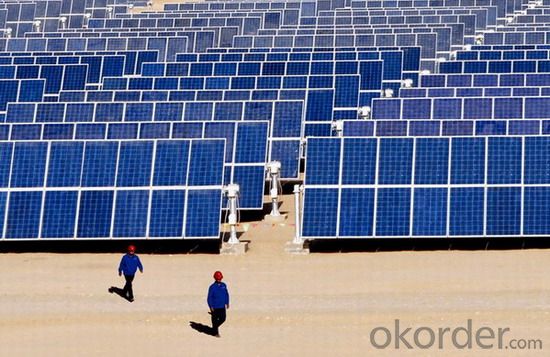
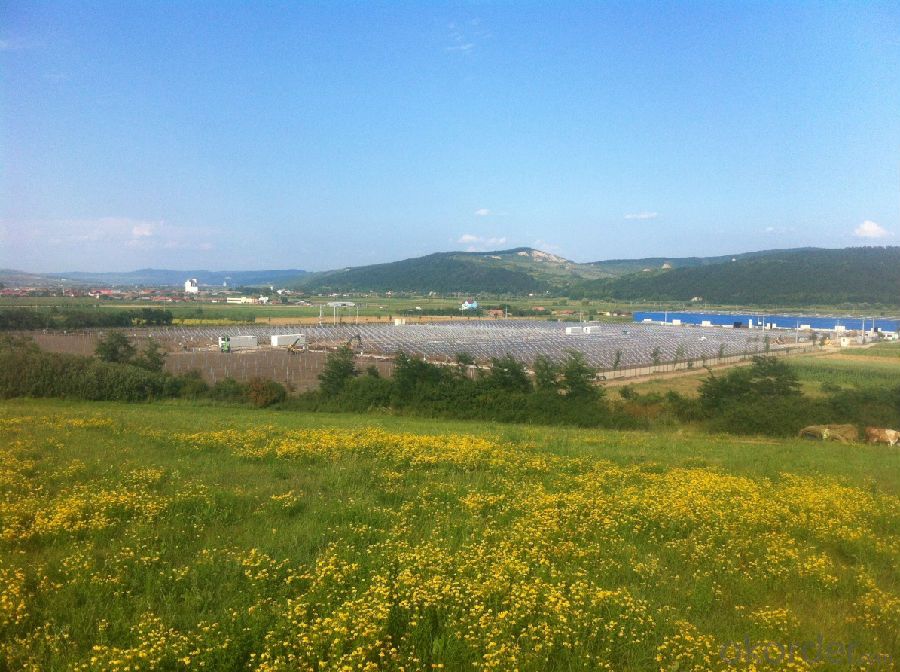
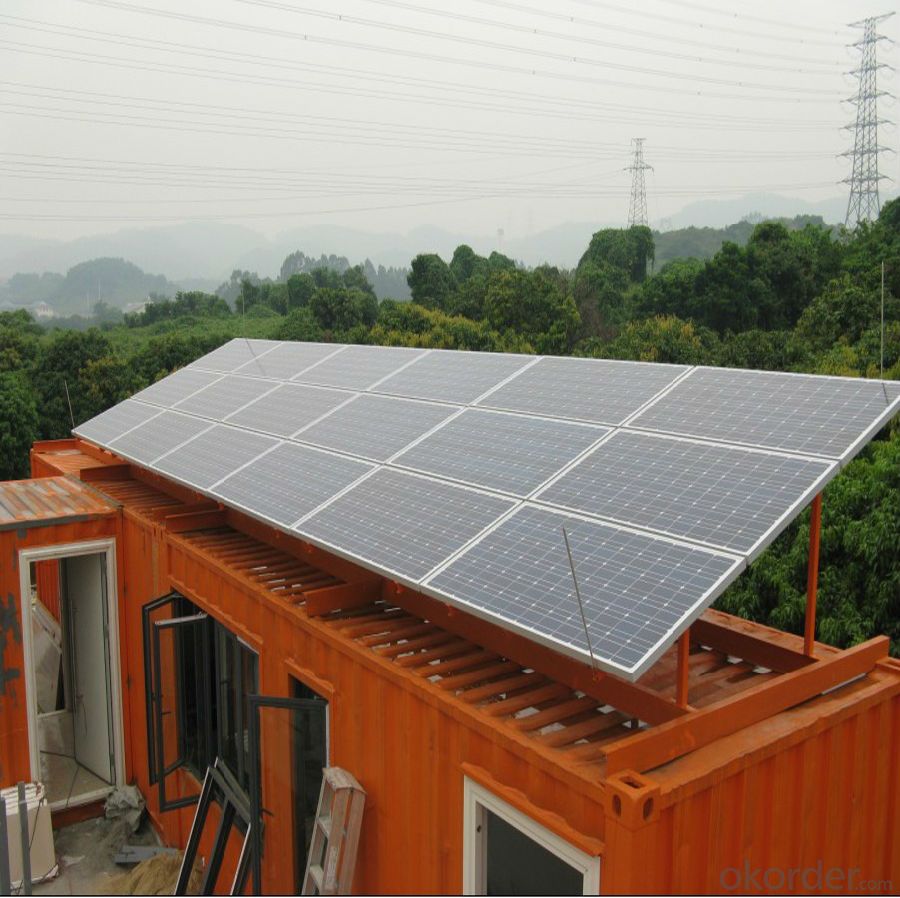
5. Production Flow
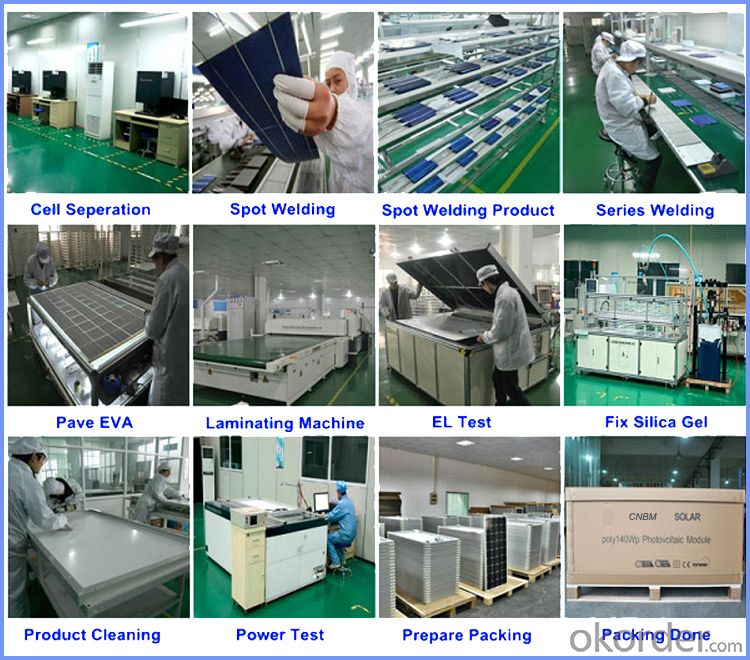
6. Packing Details
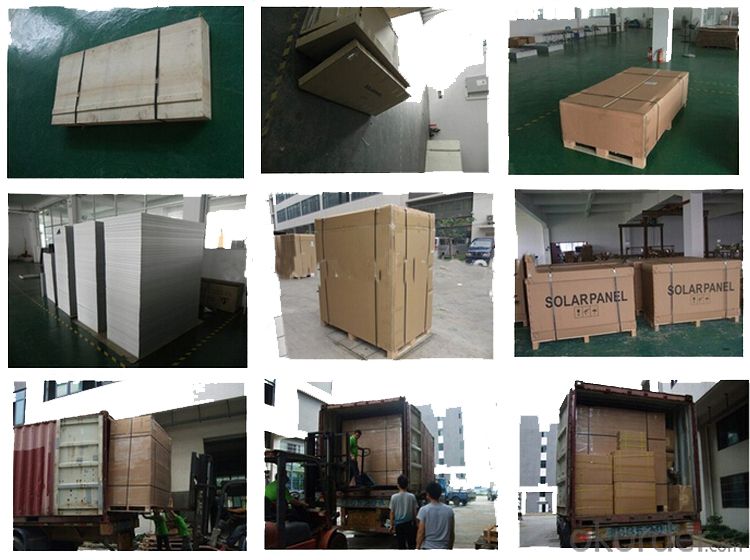
7. Use For
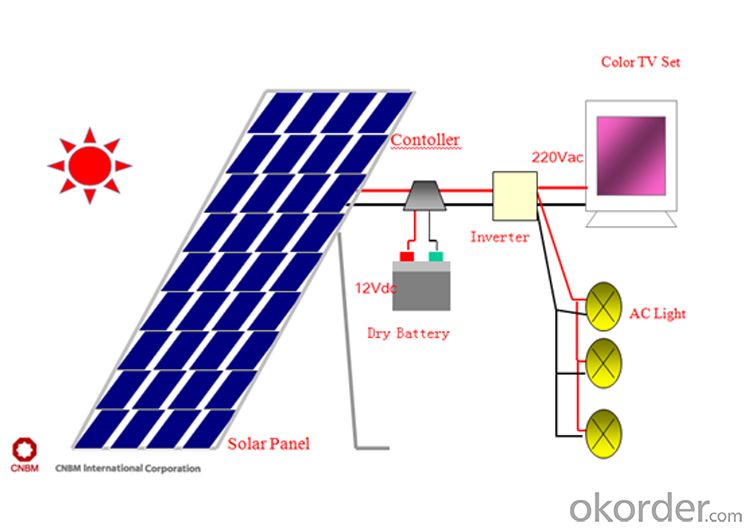
- Q: What is the average cost of solar panel installation?
- The average cost of solar panel installation varies depending on several factors such as the size of the system, location, and specific requirements. However, as of 2021, the average cost can range from $11,000 to $20,000 for a residential installation. It's important to note that there may be additional costs involved, such as permits, maintenance, and potential upgrades.
- Q: I'm trying to charge rechargeable AA batteries with a solar panel. What guage wire should I use to connect the panel to the batteries? Should I use a diode to keep the batteries from overpowering the circuit? If so, what size? My panel is 4.8V 50mA.
- You not only need a diode, but a circuit that opens the circuit if the voltage falls below a certain level. The diode is not the problem, but the batteries powering the solar panel when the voltage falls to low.
- Q: i want to join multiple solar panels into a bank so i only need one length of wire, i am going to use diodes to stop them sending power back into the one before it. is this ok or do i need something else?
- Maybe. It depends on the panels involved, and what their output is. Not all panels are able to be daisy chained.
- Q: Are solar panels suitable for residential use?
- Yes, solar panels are highly suitable for residential use. They are cost-effective, environmentally friendly, and can significantly reduce electricity bills. With advancements in technology and decreasing panel prices, solar panels have become an attractive option for homeowners to generate clean, renewable energy and contribute to a sustainable future.
- Q: okay so i want to know if solar panels shine. ------(MY Q'S ABOUT BLINDNESS DOESN'T MEAN PERMANENT OMG I CAN'T SEE! BLIND BUT THAT WE JUST CANquot;T SEE AT THE MOMENT BECAUSE OF THE LIGHT.)------------------------------like if/when they face the sun is there a glare to the people around?-if there is would the person have to look directly at it? -Could it reflect off of other objects and cause temporary blindness or just shine light in person's eyes?-if there were windows and mirrors near the solar panel would it affect a person's sight?-and if it did for how long would it hurt or take affect?-and is this physics? like-solar panels and how they work is that physics or some other category?
- The problem with solar panels is that they often come with textured glass. This makes that the reflected light is scattered +/-0°. Therefore the 0.5° sun-disk small as it aprears in the sky will be blown up 40 times to a 20° reflection disk on solar panels. Find more information on zehndorfer.at/en/glaringsurvey Only a glaring survey can tell you exactly when and where you have to expect a dazzling effect.
- Q: i need technical and non technical details to generate MW power by solar panels
- First off, you should consider cost per kilowatt-hour (kWh) since kWh is energy whereas MW is power, and kWh is a common unit of energy used by power utilities. But first you would need to design the power capacity required, which as you state, is assumed to be MW. Average system costs = $95 per square foot Average solar panel output = 0.6 watts per square foot Average solar energy system costs = $8.95 per watt Form this information, the capital cost of installing MW = $8.95 /W * 0^6 W/MW = $9 million. The lifetime of a typical solar power system is probably about 20 years. Assuming a true MW peak output of the solar panel it would be anticipated that a daily average energy production would be peak output over about 3 hours per day, or 3 MWh of energy per day. Total production over a 20 year system life would be 3 MWh * 365 days/yr * 20 yr = 22 x 0^3 MWh So in terms of costs of capitalization of the system, the cost of Energy (/kWh) = $8.95 million / 22 x 0^3 MWh = $0.40 / kWh (approximately) This cost does not include maintenance, however, given the simplicity of these systems; other than periodic equipment replacement, which is covered by specifying a 20 year complete system replacement; other maintenance cost should be relatively low. The required surface area of solar panel = 0^6 W / 0.6 W/ft^2 = 94,340 ft^2 or a little over 2 acres of panel surface area. To be able to properly access and maintain the solar array, the minimum area required would likely be 5 to 0 acres.
- Q: I am intrested in buying solar panels to save a buck and even maek some money off of it but I was wondering what kind? How Much? How Many? Are they easy to install? Whats the best brand? I want alot of information on this if anyone can give me some help on it in a user friendly way it would be appreciated!
- You will not recoup your cost in utilities savings. you will get it back in state and federal tax credits and accelerated depreciation on the system. You also have to be aware that a KV system for example is different in different climates. I just priced a system that is in Malibu,CA and it is very efficient due to sun exposure. the same system in Idaho will not create the same amount of power output. Therefore will not save the same amount on utilities. I have included a plug and play system that just came on the market. But there are other systems available.
- Q: What makes them stop working after a while?
- They are used in an environment that's very harsh for semiconductors, especially the high temperatures. Ion migration and many other failure mechanisms increase with temperature. Thermal expansion adds its own mechanical stresses.
- Q: How much per sq inch do they cost? Will i have to worry about them blowing off during hurricane season? If the sun isnt out for a week will my power go out? Will I have to check them every week and check which ones arent working and replace them? Is there anyway for them to be damaged by acid rain or any type of erosion like hail? When do I have to replace them? How do I dispose of old ones (like recycling)? What is smarter and more economical having few big panels or many small ones? I know I have alot of questions but I want a good detailed answer.
- They don't sell them by the square inch. It costs about $0 per watt of generating capacity. Unless you are connected to the grid you will need a battery bank to storage power for rainy days. As for the effects of weather ... you can probably make a cover out of plywood... but if your house blows away the solar panel goes with it. Before you buy one make sure your insurance covers it.
- Q: i wanted to buy solar panels but this guy told me one will just power one light bulb what i want to know is how much thay cost and is it true tat if more power leaves your house than goes in the power company has to send u a cheek
- If you are looking into a credit or buy back of hydro, you should be inquiring about windpower not solar...you will have better luck creating more with that than panels. It is not so much the cost of the panels that is a lot, it is the cost of everything else you will need to use/store the power....inverter, batteries...etc
Send your message to us
CE and TUV Approved High Efficiency 150W Mono Solar Panels on Roof
- Loading Port:
- Shanghai
- Payment Terms:
- TT OR LC
- Min Order Qty:
- 10000 watt
- Supply Capability:
- 20000000 watt/month
OKorder Service Pledge
OKorder Financial Service
Similar products
Hot products
Hot Searches
Related keywords
